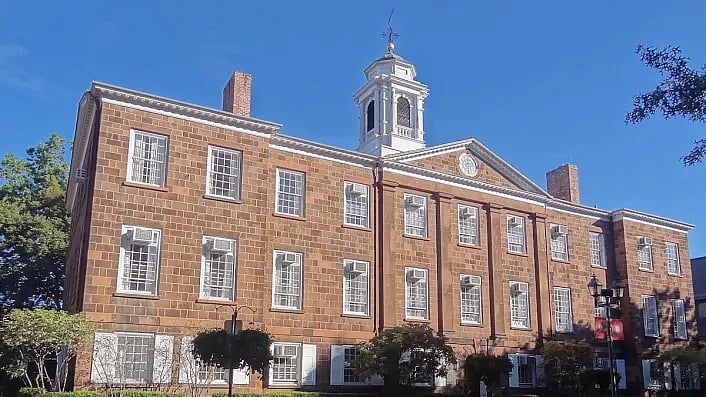Old Queens building on the campus of Rutgers University | Wikimedia Commons/India Currents
New Jersey-based Rutgers University said that its administration will not be adding caste as a separate protected category in its university policy. In a statement, the administration said that caste-based discrimination is already covered under the protected categories of race, ethnicity, ancestry, and national origin.
Anti-Caste Task Force and the University’s response
The decision comes in response to an August 2024 report published by the University’s Task Force on Caste Discrimination that recommended the addition of caste as a protected category in the university’s anti-discrimination policy. In 2023, California Governor Gavin Newsom vetoed the SB403 – dubbed the caste bill – for the same reason, stating that caste was already covered under pre-existing categories protected against discrimination in California law.
The task force, co-chaired by Professor of History Audrey Truschke, was established as part of an agreement between the University administration and the Rutgers AAUP-AFT (the American Association of University Professors-American Federation of Teachers) union. In its report, the task force also called for educational opportunities to create awareness and change regarding caste, and data collection efforts to document caste discrimination on campus.
The university’s statement reiterated that caste-based discrimination is prohibited and that the university’s Office of Employment Equity will make it explicitly clear that caste falls under the categories already protected under its anti-discrimination policy.
Additionally, individuals who believe they have been discriminated against based on their caste can reach out to a trained Intake Support Specialist to file a complaint or seek redressal. The administration will also include questions related to caste in its regular campus climate surveys as a way to collect more data about this issue.
Reactions from diaspora organizations
The Coalition of Hindus of North America (CoHNA) hailed the university’s decision and raised questions about the intentions behind the task force and its report. In a statement, the organization said that the campaign was “run by a handful of privileged students and elite professors at Rutgers, with an extensive track record of falsifying Hindu traditions and targeting its deities and traditions.”
The statement also said, “In addition to being unnecessary, the inclusion of loaded words like caste would actually lead to profiling and discrimination against students and faculty of Hindu and Indian origin, since caste is not a neutral word and instead is primarily associated with these communities.”
The Hindu American Foundation (HAF) echoed CoHNA’s stance: “Creating a separate category of caste would break with the longstanding principle of facial neutrality that underpins equal protection and non-discrimination, and would thus unlawfully single out Hindu American and South Asian Indian American students and faculty for disparate treatment and additional legal scrutiny.”
Equality Labs, an anti-caste organization at the forefront of the campaign to get SB403 signed into law, hailed the university’s explicit stance prohibiting caste-based discrimination and called the task force’s report ground-breaking. A social media post by the organization read, “We are thrilled to witness caste equity advance as a growing number of institutions of higher education are working to directly address the harms caused by caste discrimination.”
Hindus for Human Rights – another organization that was in favor of SB403 and ran an email campaign urging Rutgers’ university officials to accept the task force’s recommendations – said in its newsletter, “While we’re disappointed in the administration’s failure to adopt this much-needed civil rights policy, we are glad to see the university explicitly acknowledge for the first time that caste discrimination is prohibited at Rutgers.”
(The article is published under a mutual content partnership arrangement between The Free Press Journal and India Currents).
